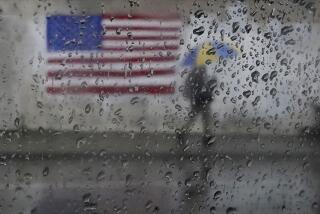There’s an Identity Crisis in Humans
- Share via
Merlin is a toy, a computer toy that little Jimmy has forsaken his teddy bear for. Fearful of the psychological consequences of sleeping with a green plastic computer, Jimmy’s mother gave him a kitten. Jimmy likes her, too. Now his emotional allegiances are divided between Merlin and Melissa, the cat.
He plays tick-tack-toe with Merlin, and unwind-the-ball-of-yarn with Melissa. Now I wonder, does he relate more closely to his cat or to his computer?
Questions like these were the focus of a recent conference at Stanford that was co-sponsored by the Humanities Center and the School of Engineering, on “Humans, Animals, Machines: Boundaries and Projections.”
Like it or not, the lines dividing animals, humans and machines are blurrier than they used to be.
“Before computers, people thought of animals as our nearest neighbors in the universe, said MIT sociologist Sherry Turkle, the author of “The Second Self: Computers and the Human Spirit.” After studying the ways children interact with computers, she concludes, “Where we were once rational animals, now we are ‘feeling computers,’ ‘emotional machines.’ ”
The development of computers has altered the way we understand ourselves in relation to the universe and has altered the value we place on emotion as compared to reason.
Throughout most of Western history, living things were the way they were at the time of Creation, according to Chicago philosopher Arnold Davidson. Any creatures that varied from that model were considered monsters. People or animals born with defects, such as Siamese twins, were looked on as warnings from God, or satanic interference. Whichever, they were “unnatural” and unwelcome.
Computers are a different story. The famous HAL from “2001” was a monstrous computer, but unlike a two-headed horse, he was a product of man, not nature. Modern science enables us to create our own monsters.
We combat our fears of both animals and machines with a single ploy. By anthropomorphizing the alien, we tame it.
Human, animal, machine--the conferees agreed on two points. The first is that as a species we are in the midst of an identity crisis. Once rulers of the universe, we now perceive our uniqueness challenged by other animals that may claim respect comparable to that we give ourselves, while the very machines we have created threaten us with intellectual obsolescence.
The second is that regardless of the eventual outcome, whether computers will make human thinking irrelevant, as some AI (artificial intelligence) experts insist, or merely change the world as powerfully as the invention of the printing press did 500 years ago, they have already altered the way we think.
Computer metaphors have seeped into everyday usage the way Freudian terms slipped in 50 years ago. Turkle recounts students dubbing what she had considered a “Freudian slip” as merely a “processing error.”
Are machines that think and man-made animals real threats? Or simply challenges? As we find that we fill a smaller space in the universe as we perceive it, we have to define the nature of that space. And while we perceive the “others,” animals and machines as monsters threatening our turf, we have to remember that, at the moment, we hold the power of their survival in our hands, and not the reverse.
More to Read
Sign up for Essential California
The most important California stories and recommendations in your inbox every morning.
You may occasionally receive promotional content from the Los Angeles Times.













